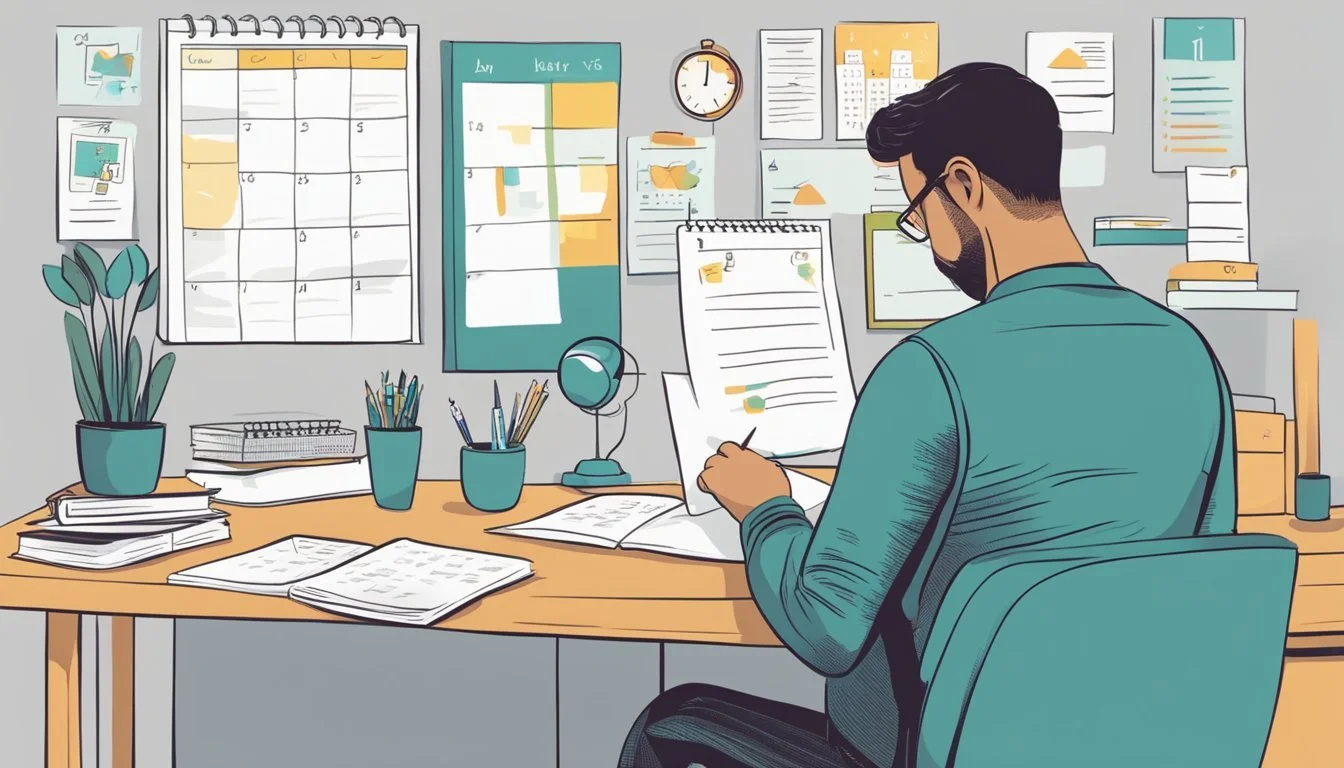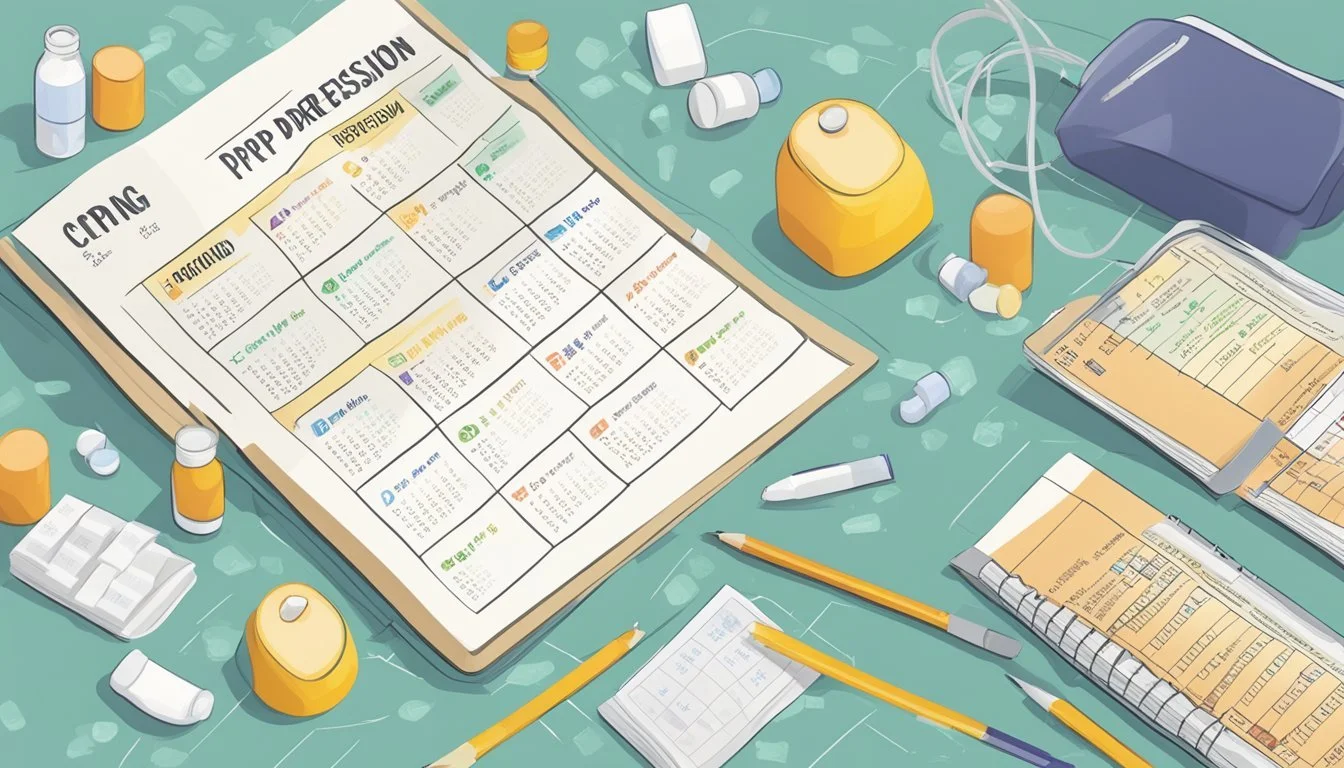15 Coping Strategies for Bipolar Depression
Effective Tools for Managing Mood Swings
Bipolar disorder affects millions worldwide, causing dramatic mood swings between manic highs and depressive lows. The depressive episodes can be particularly challenging to navigate, impacting daily functioning and quality of life. Effective coping strategies are essential for managing bipolar depression and maintaining stability.
Implementing a combination of self-help techniques, lifestyle changes, and professional treatments can significantly improve outcomes for those living with bipolar disorder. While medication often forms the foundation of treatment, incorporating various coping methods can enhance overall well-being and reduce the frequency and severity of depressive episodes. This article explores 15 practical strategies individuals can employ to better manage bipolar depression.
1) Maintain a Consistent Routine
Establishing a consistent daily routine is crucial for managing bipolar depression. A structured schedule helps stabilize mood and provides a sense of predictability, which can be comforting during depressive episodes.
Start by setting regular wake-up and bedtime hours. This helps regulate the body's internal clock and improve sleep quality, which is essential for mood stability.
Create a balanced daily schedule that includes work or productive activities, meals, exercise, and relaxation time. Stick to consistent meal times and aim for a nutritious diet to support overall well-being.
Incorporate medication management into the routine. Take prescribed medications at the same times each day to maintain consistent therapeutic levels in the body.
Include regular physical activity in the daily schedule. Exercise has mood-boosting effects and can help alleviate depressive symptoms.
Build in time for self-care activities like meditation, journaling, or engaging in hobbies. These practices can provide emotional support and promote mental wellness.
2) Exercise Regularly
Regular exercise plays a crucial role in managing bipolar depression. Physical activity releases endorphins, which can help improve mood and reduce symptoms of depression.
Engaging in cardio exercises like walking, cycling, or swimming for 30 minutes a day can have significant benefits. These activities boost energy levels and provide a healthy outlet for stress.
Strength training exercises can also be beneficial. Lifting weights or using resistance bands can increase self-esteem and provide a sense of accomplishment.
Yoga and tai chi combine physical movement with mindfulness, offering a dual approach to managing bipolar symptoms. These practices can help reduce anxiety and promote relaxation.
It's important to start slowly and gradually increase exercise intensity. Consistency is key, so finding enjoyable activities that can be sustained long-term is essential.
Exercise can also help regulate sleep patterns, which are often disrupted in bipolar disorder. Outdoor activities provide the added benefit of sunlight exposure, which can help stabilize circadian rhythms.
Always consult with a healthcare provider before starting a new exercise regimen, especially when managing bipolar disorder. They can provide guidance on safe and effective exercise strategies.
3) Practice Mindfulness
Mindfulness is a powerful tool for managing bipolar depression. It involves focusing on the present moment without judgment. This practice can help individuals become more aware of their thoughts and emotions.
Mindfulness techniques often include deep breathing exercises and meditation. These methods can calm the mind and reduce stress. Regular practice may also improve mood and decrease anxiety symptoms.
One simple mindfulness exercise is to focus on breathing. Inhale slowly for a count of three, then exhale for three. Notice the sensation of breath moving in and out of the body.
Another approach is body scanning. This involves mentally scanning the body from head to toe, noticing any sensations without trying to change them. This can help ground a person in the present moment.
Mindfulness can be practiced anywhere, at any time. Even a few minutes daily can make a difference. It may help individuals recognize early signs of depressive episodes and respond more effectively.
With consistent practice, mindfulness can become a valuable coping strategy for those with bipolar depression. It offers a way to observe thoughts and feelings without becoming overwhelmed by them.
4) Stay Connected with Loved Ones
Maintaining strong connections with family and friends is crucial for managing bipolar depression. Social support can provide emotional comfort and practical assistance during difficult times.
Regular communication with loved ones helps individuals feel less isolated and more understood. This can be achieved through phone calls, text messages, video chats, or in-person visits.
Sharing feelings and experiences with trusted individuals can alleviate emotional burden. It also allows others to recognize potential warning signs of mood episodes and offer timely support.
Participating in social activities, even when feeling low, can boost mood and provide distraction from negative thoughts. Simple outings like walks or coffee dates can be beneficial.
Family and friends can assist with daily tasks or remind about medication schedules. This practical support can be invaluable during depressive episodes when self-care becomes challenging.
Support groups for people with bipolar disorder offer opportunities to connect with others who understand the unique challenges of the condition. These groups can provide valuable coping strategies and reduce feelings of loneliness.
5) Set Realistic Goals
Setting realistic goals is essential for managing bipolar depression. Small, achievable objectives can provide a sense of accomplishment and motivation during depressive episodes.
Start by breaking larger tasks into smaller, manageable steps. This approach makes goals less overwhelming and more attainable. For example, instead of aiming to clean the entire house, focus on tidying one room at a time.
Create specific, measurable goals to track progress. Rather than a vague aim to "exercise more," set a concrete target like walking for 15 minutes three times a week. This allows for clear monitoring of achievements.
Be flexible with timelines and adjust goals as needed. Bipolar depression can fluctuate, so it's important to adapt expectations accordingly. If energy levels are low, modify goals to match current capabilities.
Celebrate small victories along the way. Recognizing progress, no matter how minor, can boost mood and motivation. This positive reinforcement encourages continued effort towards larger objectives.
Consider using tools like mood charts or goal-tracking apps to visualize progress. These can help identify patterns and maintain focus on long-term improvements in managing bipolar depression.
6) Follow a Medication Plan
Adhering to a prescribed medication regimen is crucial for managing bipolar depression. Mood stabilizers, antidepressants, and antipsychotics are commonly used to treat this condition.
Consistency is key when taking medications. Patients should take their prescribed doses at the same time each day to maintain steady levels in the bloodstream.
It's important to communicate openly with healthcare providers about any side effects or concerns. Adjustments to dosage or medication type may be necessary to find the optimal treatment plan.
Patients should never stop taking their medications abruptly or change their dosage without consulting their doctor. Sudden changes can lead to mood instability or relapse.
Keeping a medication log can help track adherence and any effects on mood or symptoms. This information is valuable for discussions with healthcare providers.
Some medications require regular blood tests to monitor levels and check for potential side effects. Patients should follow through with these tests as recommended by their doctor.
Using pill organizers or setting reminders can help ensure medications are taken as prescribed. Developing a routine around medication times can also improve adherence.
7) Cognitive Behavioral Therapy (CBT)
Cognitive Behavioral Therapy (CBT) is an effective treatment approach for bipolar depression. This therapy focuses on identifying and changing negative thought patterns and behaviors that contribute to depressive episodes.
CBT helps individuals with bipolar disorder develop coping strategies to manage their symptoms. Therapists work with patients to recognize early warning signs of mood episodes and implement interventions to prevent them from escalating.
One key component of CBT for bipolar depression is mood tracking. Patients may keep a daily journal to monitor their mood fluctuations and identify triggers. This practice enhances self-awareness and allows for timely adjustments in coping strategies.
CBT also addresses depressive symptoms by challenging and reframing negative thoughts. Patients learn to question the validity of their pessimistic beliefs and replace them with more balanced, realistic perspectives.
Additionally, CBT can improve medication adherence, which is crucial for managing bipolar disorder. Therapists help patients understand the importance of consistent treatment and develop strategies to overcome barriers to adherence.
Through CBT, individuals with bipolar depression can acquire valuable skills to regulate their emotions, solve problems, and improve their overall quality of life.
8) Limit Alcohol and Drugs
Limiting alcohol and drug use is crucial for managing bipolar depression. Substances can interfere with mood stability and medication effectiveness, potentially worsening symptoms.
Alcohol is a depressant that can trigger or intensify depressive episodes. It may also lead to poor decision-making and risky behaviors during manic phases.
Many drugs, including stimulants and hallucinogens, can disrupt sleep patterns and mood regulation. This disruption can precipitate mood swings or exacerbate existing symptoms.
Individuals with bipolar disorder are at higher risk for substance abuse disorders. Avoiding or minimizing substance use helps maintain emotional balance and supports overall treatment efforts.
For those struggling with substance use, seeking professional help is advisable. Addiction specialists can provide appropriate treatments that address both bipolar disorder and substance use issues.
Developing healthy coping mechanisms to replace substance use is essential. Engaging in physical activity, practicing mindfulness, or pursuing creative hobbies can serve as positive alternatives.
9) Healthy Diet
A nutritious diet plays a crucial role in managing bipolar depression. Eating well-balanced meals can help stabilize mood and energy levels throughout the day.
Individuals with bipolar disorder should focus on consuming fruits, vegetables, lean proteins, and whole grains. These foods provide essential nutrients that support brain function and overall health.
Reducing intake of processed foods, sugary snacks, and caffeine can help minimize mood fluctuations. Omega-3 fatty acids, found in fish, flaxseeds, and walnuts, may have mood-stabilizing properties.
Staying hydrated is also important. Drinking plenty of water helps maintain proper brain function and can contribute to better emotional regulation.
Establishing regular meal times can provide structure and routine, which are beneficial for those managing bipolar depression. Avoiding skipping meals helps maintain steady blood sugar levels, potentially reducing mood swings.
Consulting with a nutritionist or dietitian can be helpful in developing a personalized meal plan that supports mental health while addressing individual dietary needs and preferences.
10) Sleep Hygiene
Sleep hygiene plays a crucial role in managing bipolar depression. Establishing a consistent sleep schedule helps regulate mood and energy levels. Going to bed and waking up at the same time every day, even on weekends, can stabilize circadian rhythms.
Creating a relaxing bedtime routine signals to the body that it's time to wind down. This may include activities like reading, gentle stretching, or listening to calming music. Avoiding screens for at least an hour before bed can also improve sleep quality.
The bedroom environment should be conducive to rest. A cool, dark, and quiet space promotes better sleep. Using blackout curtains, white noise machines, or earplugs can help create an optimal sleep setting.
Regular exercise during the day can improve sleep quality at night. However, vigorous workouts should be avoided close to bedtime as they may interfere with falling asleep.
Limiting caffeine, alcohol, and large meals in the evening can prevent sleep disturbances. These substances can disrupt sleep patterns and lead to restless nights.
Practicing relaxation techniques such as deep breathing or progressive muscle relaxation can help calm the mind and body before sleep. These methods can be particularly helpful during periods of heightened anxiety or stress.
11) Journaling
Journaling can be a powerful tool for managing bipolar depression. It provides a safe space for individuals to express their thoughts and emotions without judgment.
Regular journaling helps track mood patterns and identify potential triggers for depressive episodes. This self-awareness can be valuable for both patients and their healthcare providers in developing effective treatment strategies.
Writing prompts can stimulate self-reflection and encourage exploration of thoughts and feelings. Some useful prompts include tracking daily moods, listing coping mechanisms, and reflecting on positive experiences.
Journaling also offers an opportunity to practice gratitude. Focusing on positive aspects of life can help counterbalance negative thoughts associated with depression.
For some, the act of writing itself can be therapeutic. It provides a creative outlet and a sense of accomplishment, which can boost mood and self-esteem.
Consistency is key when incorporating journaling into a coping strategy. Setting aside a specific time each day for writing can help establish a routine and maximize its benefits.
12) Self-Education on Bipolar Disorder
Knowledge is power when managing bipolar disorder. Learning about the condition empowers individuals to recognize symptoms, understand triggers, and make informed decisions about their care.
Reliable sources for self-education include reputable mental health organizations, medical journals, and books written by experts in the field. These resources provide valuable insights into the latest research and treatment options.
Online courses and webinars offer structured learning experiences. They often cover topics such as symptom management, medication adherence, and lifestyle adjustments that support stability.
Support groups, both in-person and online, provide opportunities to learn from others' experiences. Hearing real-life stories can offer practical coping strategies and foster a sense of community.
Keeping a mood journal helps individuals track patterns and identify personal triggers. This self-observation tool enhances understanding of one's unique bipolar experience.
Regular discussions with mental health professionals can clarify questions and provide personalized information. These conversations ensure that self-education aligns with professional guidance.
13) Develop a Crisis Plan
Creating a crisis plan is essential for managing bipolar depression. This plan outlines steps to take during severe episodes or emergencies.
A comprehensive crisis plan includes important contact information for healthcare providers, trusted friends, and family members. It should list current medications, dosages, and any known allergies.
The plan should identify warning signs of an impending crisis and detail specific coping strategies that have been effective in the past. Including preferred treatment options and hospital preferences can guide care if hospitalization becomes necessary.
It's crucial to share the crisis plan with key support people and keep copies in easily accessible locations. Regularly reviewing and updating the plan ensures its effectiveness.
A crisis plan empowers individuals to take proactive steps during challenging times. It provides a sense of control and helps ensure appropriate care is received promptly when needed.
14) Creative Outlets (e.g., Art or Music)
Engaging in creative activities can be an effective coping strategy for individuals with bipolar depression. Art and music offer expressive outlets that allow people to process emotions and reduce stress.
Painting, drawing, or sculpting provide visual ways to communicate feelings that may be difficult to verbalize. These art forms can help externalize internal struggles and promote self-reflection.
Music has powerful mood-altering effects. Listening to uplifting songs or playing an instrument can boost mood and energy levels. Singing or songwriting enables emotional release and self-expression.
Dance combines physical movement with creativity, potentially increasing endorphin production. This activity allows individuals to "step out" of depressive thought patterns through bodily expression.
Writing in a journal or crafting poetry offers a private space to explore thoughts and emotions. This creative outlet can provide clarity and perspective on one's experiences with bipolar depression.
Photography allows people to capture moments of beauty or significance, shifting focus away from negative thoughts. It encourages mindfulness and appreciation of one's surroundings.
15) Recognize Early Warning Signs
Identifying early warning signs of bipolar depression is crucial for effective management. These signs can vary from person to person but often include subtle changes in mood, behavior, or energy levels.
Common warning signs may include changes in sleep patterns, decreased interest in activities, or feelings of sadness or hopelessness. Some individuals may experience increased irritability or difficulty concentrating.
Physical symptoms like fatigue or changes in appetite can also signal the onset of a depressive episode. Recognizing these early indicators allows for prompt intervention and implementation of coping strategies.
Keeping a mood journal or using mood tracking apps can help identify patterns and potential triggers. This practice enables individuals to become more attuned to their emotional state and recognize subtle shifts.
Sharing these warning signs with trusted friends, family members, or healthcare providers can create a support network. These individuals can offer additional perspective and support when early signs of depression emerge.
Regular check-ins with a mental health professional can also aid in identifying and addressing warning signs before they escalate into a full depressive episode.
Understanding Bipolar Depression
Bipolar depression is a complex mood disorder characterized by alternating periods of depression and mania or hypomania. It significantly impacts a person's daily life and relationships.
Definition and Symptoms
Bipolar depression refers to the depressive episodes experienced by individuals with bipolar disorder. Common symptoms include:
• Persistent sadness or emptiness • Loss of interest in activities • Changes in sleep patterns • Fatigue or loss of energy • Difficulty concentrating • Feelings of worthlessness or guilt • Thoughts of death or suicide
These symptoms often last for at least two weeks and interfere with daily functioning. Unlike unipolar depression, bipolar depression is punctuated by manic or hypomanic episodes.
Causes and Risk Factors
The exact causes of bipolar depression are not fully understood, but several factors contribute to its development:
• Genetics: Having a first-degree relative with bipolar disorder increases the risk.
• Brain structure and function: Differences in brain chemistry and structure may play a role.
• Environmental factors: Stress, trauma, or significant life changes can trigger episodes.
• Substance abuse: Drug or alcohol misuse may increase the risk or exacerbate symptoms.
Other risk factors include childhood trauma, sleep disturbances, and certain medical conditions. Hormonal changes, particularly during pregnancy or menopause, can also influence bipolar depression onset or severity.
Importance of Coping Strategies
Coping strategies play a vital role in managing bipolar depression. These techniques help individuals improve their quality of life and reduce the frequency and severity of depressive episodes.
Improving Quality of Life
Effective coping strategies enhance daily functioning for those with bipolar depression. They provide tools to navigate challenging emotions and situations. Cognitive Behavioral Therapy (CBT) teaches skills to identify and modify negative thought patterns. This can lead to improved mood and self-esteem.
Mindfulness techniques help individuals stay present and reduce rumination. Regular practice can decrease anxiety and promote emotional stability. Establishing a consistent sleep schedule supports mood regulation and overall well-being.
Social support networks offer crucial emotional backing. Connecting with others who understand bipolar depression can reduce feelings of isolation. Engaging in enjoyable activities boosts mood and provides a sense of accomplishment.
Reducing Episodes
Coping strategies can significantly decrease the frequency and intensity of depressive episodes. Medication adherence is a key component in managing symptoms. Developing routines around taking medication helps ensure consistency.
Recognizing early warning signs allows for prompt intervention. Keeping a mood journal aids in identifying triggers and patterns. This awareness enables individuals to take proactive steps before symptoms escalate.
Stress management techniques, such as deep breathing exercises, help prevent mood fluctuations. Regular exercise has been shown to alleviate depressive symptoms and boost energy levels. Creating a structured daily routine provides stability and reduces the likelihood of depressive episodes.
Developing a Support System
Building a strong support network is crucial for managing bipolar depression. Connecting with understanding individuals and seeking professional guidance can provide emotional stability and practical assistance during challenging times.
Role of Family and Friends
Family and friends play a vital role in supporting those with bipolar depression. Open communication helps loved ones understand the condition and its impact. Educate close contacts about bipolar symptoms and how they can offer assistance during mood episodes.
Establish a crisis plan with trusted individuals. This plan should outline specific actions to take if symptoms worsen. Include emergency contact information and preferred treatment options.
Encourage family members to attend support groups or educational workshops. These resources can help them better understand bipolar disorder and learn effective ways to provide support.
Seeking Professional Help
Professional support is essential for managing bipolar depression. A psychiatrist can provide medication management and monitor treatment progress. Regular appointments help adjust medications as needed and address any concerns.
Therapy, such as cognitive-behavioral therapy (CBT) or interpersonal therapy, can teach coping skills and improve relationships. A therapist can also help identify triggers and develop strategies to manage mood fluctuations.
Consider joining a bipolar support group led by a mental health professional. These groups offer a safe space to share experiences and learn from others facing similar challenges.
Establish a relationship with a primary care physician to address physical health concerns that may impact bipolar symptoms.










